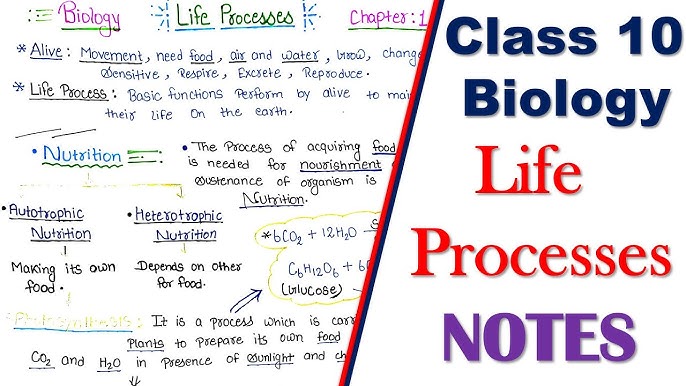Class 10 Science Chapter 6 Question Answer
Class 10 Science Chapter 6 Question Answer: Life processes are important functions that are essential for the survival of living organisms. These processes include nutrition, respiration, transportation of substances, excretion, and reproduction. Nutrition involves the intake of food and its breakdown to provide energy, while respiration is the process of releasing energy from food molecules. Transportation of substances refers to the movement of nutrients, gases, and wastes within the body. Excretion is the removal of metabolic waste products from the body, while reproduction is the process by which organisms produce offspring.
Key Concepts of Life Processes in Class 10 Science: Questions and Answers
These life processes are vital for maintaining homeostasis, which is the ability of an organism to regulate and maintain a stable internal environment despite external changes. For example, the process of respiration helps to provide cells with oxygen and remove carbon dioxide, ensuring the proper functioning of all organs and systems in the body. Similarly, the process of excretion helps to eliminate harmful waste products and maintain the body’s internal balance.
Understanding the key concepts of life processes in science enables students to appreciate the complexity of living organisms and the interconnectedness of different systems within the body. By studying these processes, students can gain a deeper understanding of how organisms function and adapt to their environment. This knowledge is not only important for academic purposes but also for fostering a greater appreciation for the diversity and resilience of life on Earth.
Life Processes Class 10: Practice Questions and Answers for Better Understanding
Life processes are essential functions that living organisms perform to survive and thrive. These processes include activities like respiration, digestion, circulation, excretion, and reproduction. Each of these processes is crucial for maintaining the health and functioning of an organism.
In Class 10, students learn in detail about the different life processes that occur in living organisms. They study how organisms obtain and utilize energy, eliminate waste products, and maintain internal balance. Understanding these processes helps students appreciate the complexity and beauty of life.
Practicing questions related to life processes can help students reinforce their understanding and improve their knowledge of the subject. By answering questions and solving problems, students can test their comprehension and identify areas where they need further clarification. This iterative process of learning and practice leads to a better understanding of life processes.
Exploring Life Processes in Class 10 Science: Important Questions and Answers
In class 10 Science, students delve into the fascinating world of life processes that occur in living organisms. They learn about the various functions that sustain life, such as nutrition, respiration, transportation, and excretion. These life processes are essential for the growth, development, and survival of all living beings. Through hands-on experiments, diagrams, and explanations, students gain a better understanding of the intricacies of how the human body functions.
Important questions that are often explored in class 10 Science include the process of digestion, the role of enzymes in breaking down food into nutrients, and how the respiratory system helps in the exchange of gases. Students also learn about the importance of blood circulation in the transportation of oxygen and nutrients to different parts of the body, as well as the elimination of waste products through the excretory system. By understanding these fundamental life processes, students can appreciate the complexity and interconnectedness of different systems within the human body.
By studying life processes in class 10 Science, students also gain insights into how living organisms adapt to their environment to survive. They learn about the concept of homeostasis and how organisms maintain a stable internal environment despite changes in the external environment. Through these lessons, students develop a holistic understanding of the intricate mechanisms that govern life processes and the importance of maintaining a balance for overall well-being.
Class 10 Biology: Life Processes – Question and Answer Session
In biology, life processes refer to the various activities that living organisms carry out to maintain their existence. These processes include nutrition, respiration, transportation, excretion, circulation, and reproduction. Each of these processes is essential for the survival of an organism and plays a crucial role in maintaining the balance within the body.
Nutrition is the process through which organisms obtain and utilize food for energy and growth. Respiration involves the exchange of gases, specifically the intake of oxygen and the release of carbon dioxide. Transportation refers to the movement of materials within the body, such as nutrients, hormones, and waste products. Excretion involves the removal of waste products from the body, while circulation refers to the distribution of essential substances throughout the body. Finally, reproduction is essential for the continuation of a species.
Understanding life processes is crucial for biology students as it provides insight into how organisms function and survive. By studying these processes, scientists can develop a better understanding of the mechanisms that govern life and health. Overall, life processes are a fundamental aspect of biology that helps us appreciate the complexity and beauty of the natural world.
Enhancing Your Knowledge on Life Processes: Extra Questions and Answers for Class 10 Science
Studying life processes is crucial in understanding how living organisms function and survive. By delving deeper into topics such as respiration, digestion, circulation, and excretion, students can gain a comprehensive understanding of how their bodies work. This knowledge can not only help them excel in their science classes but also lead to a better understanding of the world around them.
One way to enhance your knowledge of life processes is to conduct hands-on experiments or demonstrations. For example, you can set up a simple experiment to observe the process of respiration in plants or animals or simulate the digestive system using household items. By actively and practically engaging with the material, you can deepen your understanding and retention of the concepts being taught.
Additionally, seeking out additional resources such as online tutorials, documentaries, or books can provide further insights into life processes. It’s important to remain curious and continuously seek out new information to expand your knowledge base. By taking a proactive approach to your studies and being open to learning from a variety of sources, you can enhance your understanding of life processes and develop a greater appreciation for the intricate mechanisms that allow living organisms to thrive.
Acceleration Due To Gravity Dimensional Formula
Acceleration due to gravity, denoted as g, refers to the rate at which an object accelerates towards the Earth’s surface due to gravitational force. The dimensional formula for acceleration due to gravity is derived from Newton’s second law of motion. Since acceleration is the rate of change of velocity concerning time, the dimensional formula of g is given as [M^0 L^1 T^−2]. Here, M represents mass, L represents length, and T represents time. Understanding the dimensional formula of acceleration due to gravity is essential in various physics calculations, particularly in mechanics and gravitational fields.






[…] Class 10 Science Chapter 6 Question Answer […]